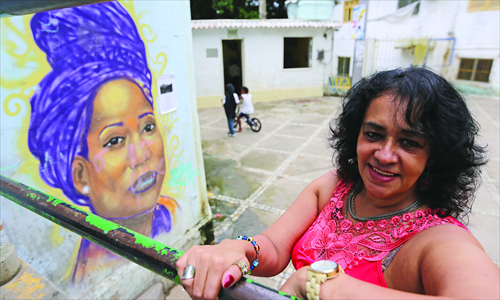From slum to bookshop
Source:AFP Published: 2015-11-8 19:43:01
Brazil drug queen turns writer

Raquel de Oliveira Photo: AFP
She started sniffing glue at age 6 to ease the hunger of life in a Brazilian slum. She got her first revolver when she was 11.
Now 54, Raquel de Oliveira, once the first lady of the drug trade in the Rio de Janeiro favelas, has taken up the pen.
After a decade in treatment for alcoholism and drug addiction, she has published her first novel, Number One.
"Literature is the only thing that has kept me standing," says Oliveira, an energetic talker with long dark hair, in an interview with AFP.
"Writing gives me pleasure. It takes the place of cocaine. It helps me flee from the pain."
In the 1980s Oliveira was the lover of one Naldo, the drug lord of Brazil's biggest favela, La Rocinha, in Rio de Janeiro.
After he was killed in a shootout with police, she became a drug trafficker herself, but was ruined by her own alcohol and cocaine habit.
She made it into rehab, discovered poetry, completed high-school studies and university.
"This book is the story of my life," she says.
Prostitutes and priests
She grew up in a shack with a dirt floor that she shared with a father she describes simply as a pedophile.
"When I was little, our soda drink was wine mixed with water and sugar. All the children drank it," she recalled.
She was not yet 6 when her father locked her in the shack and abandoned her.
She escaped onto the rooftops of the slum, where other children lived and spent their days flying kites and sniffing glue.
When she was 9 her grandmother intervened.
"She was addicted to roulette and I was a way to raise money."
The grandmother sold her to a gambling boss, the so-called "godfather" of various young girls.
"He was very friendly and protective. He bought the girls because he thought he was helping the families," Oliveira said. "When I got to his house, about three of the girls were pregnant by him."
She escaped being forced into prostitution by a priest of Umbanda, an Afro-Brazilian cult.
"This girl will not be a whore," the holy man told the Godfather.
"You must adopt her."
Oliveira says the gangster listened to the holy man and treated her like a daughter. When she was 11 he gave her a revolver to defend herself against bandits.
Queen of the slums
Her life changed at 25 when she started her three-year relationship with Naldo.
"He was the love of my life. I liked how he loved me and all the things he gave me: security, affection, compulsive sex," she said.
For several years she carried on Naldo's trafficking work by herself in Rocinha, where she still lives. She drank and took cocaine more than ever.
"Cocaine was my passion," she says. "It replaced all the sex and love that I'd lost with my dead husband."
In 2005, a friend helped get her back on the rails.
She says she has no regrets.
"I managed to face up to everything that happened with dignity," she said.
"My life could have been much worse."
Posted in: Books, Miscellany